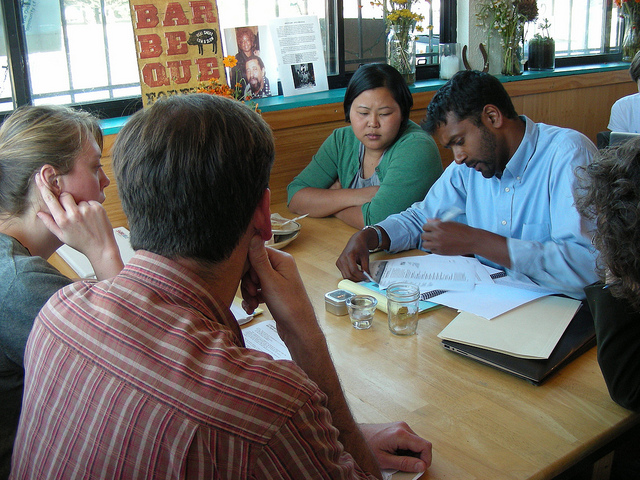Increasing Diversity in the Legal Profession through Legal Apprenticeships


Attorney Sushil Jacob advises clients at SELC’s Resilient Communities Legal Cafe, along with Thea Chhun, a legal apprentice at the Homeless Action Center.
I recently had a conversation with a woman named Jimena who described her long-time dream of going to school. In her late 30s, Jimena works for a social justice organization while raising her children. She had been accepted into law schools, but ultimately decided not to attend for a variety of reasons:
- She likes her job and is committed deeply to the communities she currently serves,
- She did not want to uproot her family and relocate to be close to a law school,
- The rising cost of law school felt intimidating, and
- Even with financial aid, she could not support a family while going to law school.
But our society needs people like Jimena to become lawyers. We need lawyers who have strong bonds and commitments to their communities, especially within low income and/or communities of color. We need lawyers with real life experience like Jimena’s.
At the same time, Jimena’s instinct to decline the law schools’ offers may have been a good one. As a highly effective community organizer, Jimena may do a disservice to her community if she left for law school at this point in her career. Jimena may have had the foresight and wisdom to know that law school might actually keep her from meeting her goals and her community’s needs.
Anyone who has attended law school knows that law school does something to you. Let’s face it: It’s hard to stay true to yourself and your values when you have $200,000 in educational debt looming, when everyone around you says “you should just work for a big firm for a while,” and when the picture of “success” as a lawyer generally involves impressive credentials – work on a law journal, maybe a judicial clerkship, and so on. All of these burdens and expectations lower the probability that a new lawyer will return to serve their communities of origin and the communities most in need of legal services.
If legal apprenticeships were more widely viewed as a pathway to becoming a lawyer, we might have more lawyers who
- Come from and later serve low-income communities
- Come from and later serve rural communities
- Have unique styles of learning and thinking
- Bring a more diverse range of life experiences to the practice of law
- Have the flexibility to work for moderate-paying public interest jobs
And because the nature of their training will be different, they may be even better prepared to serve communities. Lawyers trained through legal apprentices may be more likely to begin their legal careers with:
- Highly practical experience under their belts
- No debt; maybe even savings
- Intimate knowledge of the communities they serve
- A diverse set of cultural and social sensitivities from time spent directly working with communities
- Capacity and confidence to start their own private practices and legal service organizations
That the legal profession is demographically out of touch with American society is undeniable: According to the American Bar Association, 88 percent of lawyers are white, 70 percent are men, and 75 percent are over the age of 40. Many within the legal community have realized this and are working to make needed changes, from President Obama’s suggestion to reduce law school to two years to the ABA Task Force’s call for sweeping changes to the legal education system. However, it’s possible that simply reforming law school curricula or shortening law school to two years is not enough to attract and empower people like Jimena. Something as simple and easy as spreading awareness about an already existing alternative to law school might turn out to be one of the most effective and direct ways of diversifying the profession, expanding access to the law, and ultimately creating more resilient communities.
This article was co-authored with Chris Tittle.

Leave a comment
You must be logged in to post a comment.